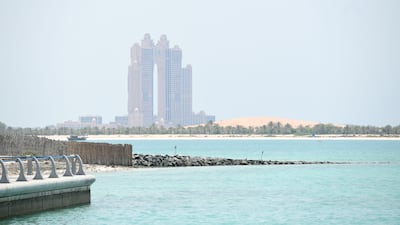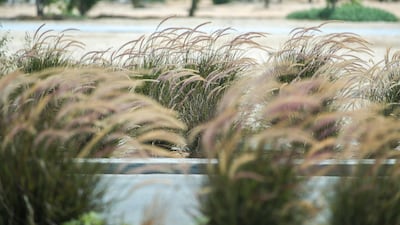The end of another scorching summer is in sight in the UAE – but will the start of September herald a return to cooler climes?
The answer isn't quite as simple as you might think, with recorded temperatures not always an accurate barometer for how hot it feels.
The mercury typically drops in September from the searing highs of August, when temperatures topped 50°C on occasion, but high humidity can make the month a sticky and rather uncomfortable experience.
Why is September so humid?
It is not without good cause that the ninth month of the year is often referred to as 'Sweat-tember'.
So why is it that September is so muggy and why does the air feel so humid even after soaring summer temperatures have peaked?
“If the temperature decreases, the relative humidity increases,” Dr Ahmed Habib, from the National Centre of Meteorology, previously told The National.
“In September, especially at night and early morning, the relative humidity increases.
“When the relative humidity increases, the human feel of the temperature increases also."
The science behind humidity
In July and August, a low-pressure system associated with easterly and south-easterly winds tends to predominate.
These winds tend to be drier, so while the temperatures are extremely high, the air is less humid than it becomes from September onwards.
Humidity comes from water evaporating from large bodies of water. As temperatures rise, the seas heat up, for example, causing more moisture to evaporate into the atmosphere. This is why humidity is worse in coastal areas, such as Abu Dhabi city and Dubai.
At times of high humidity, it is especially important to stay hydrated. When possible, avoid going outside, and those who exercise outdoors should be particularly aware of the potential dangers of heatstroke. At home, a dehumidifier can help by sucking moisture out of the air.
How hot is it in September?
While it can feel like the UAE has only two seasons – hot and hotter – summer will give way to autumn this month, bringing with it a drop in temperatures but also that rise in humidity.
The changing of the season is signified in the astronomy world by the autumnal equinox, which marks the time when days and nights are roughly equal length and is determined by the Earth's orbit and its proximity to the Sun.
Ibrahim Al Jawran, chairman of the Emirates Astronomy Society, last week said September 23 would be the first day of autumn.
The average daily temperature in September is 33.4°C, official statistics from the NCM show, down from 35.7°C in August.
On days when humidity levels are lower, therefore, September will bring some welcome respite from the baking temperatures of August.
The UAE recorded the hottest day this year on August 26, with the mercury climbing to 50.8°C.
The average relative humidity in September is 76 per cent, up from 72 per cent in August.
Humidity levels have reached 100 per cent in the Emirates, though this is infrequent.
A 100 per cent reading means the air is totally saturated and is no longer able to absorb moisture, even human sweat, and this disrupts our cooling process.
In keeping with the country's dry climate, rainfall remains low in September.
The NCM figures show the country usually receives 5.7mm of rain throughout the month.








